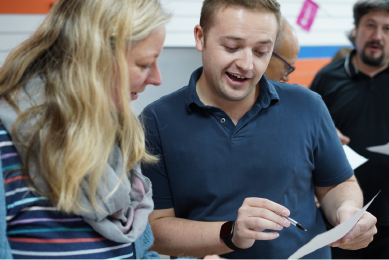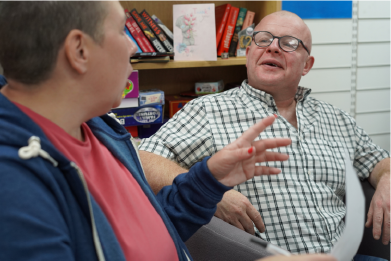
A couple of years ago we were looking for a way to help ensure our Board of Trustees had a direct line to see and hear about the work that was going on in each of our services. One idea we decided to go with was setting up and hosting ‘Citizens Assemblies’. This sounded great, a chance to bring together different groups and hear about their views on how they felt Project 6 was working.
Like all the best ideas, this one launched at the height of lockdown. Despite and pending threat to life as we knew it, we ploughed on, inviting people onto Zoom, to discuss what they wanted from Project 6 to support their wellbeing through the pandemic. Fifteen or so faces looking a little unsure what was being asked of them and facilitated by a couple of staff who were frankly a little unsure what they were asking.
These first sessions went OK. They were a chance for people to share some ideas, have a say in what was going on, and Project 6 got some suggestions they could try to feed into their daily operations.
We aspire to be a learning organisation, so OK is… well, OK, but we are always challenging ourselves to ask what better looks like.
So, what is a Citizens Assembly? If you google the term, you will find several examples of these events taking place, they’ve been held to look at issues ranging from climate change to Brexit to Social Care. They are a model of deliberative democracy and their purpose is to bring together a cross-section of society to learn about and debate an issue. The group then draws conclusions and make recommendations collectively that those with more power to change things are asked to consider. Rather than relying on nominated representatives, or individuals appointed to act in a group’s best interest, a community can have an informed say on an issue affecting them (without having to wait for a change of leadership, say at a General Election).
This is what was missing from our early attempts. A Citizens Assembly is not just feedback or a focus group; it’s a space where problems are unpicked, solutions developed, and decisions are made.
As soon as we were able to meet again in person, we did with our first face-to-face assemblies. For our next attempts, we proactively sought to bring together people from across our services, from the enthusiastic to those who are more reluctant, to the people who don’t see the point in sharing their voice. We made sure we had representatives from the Board, senior leadership, staff, and volunteers present for the whole event.
This time we asked a single question: ‘How do we make these Citizens Assemblies accessible to everyone at Project 6?’. We prepared information and fact sheets, and we planned a series of activities to help structure a discussion in a way that everyone was able to contribute. We committed a full day to the process and allowed plenty of space for more informal conversations and chats that help break down those perceived hierarchies.

This time, we had those richer discussions that take place when people are in the same space for an extended period of time. People opened up about how they felt about a problem, the whole group benefiting from a diverse range of personal experiences, viewpoints, and opinion. We generated new ideas collaboratively that pushed and challenged the suggestions that had gone up on the wall early in the day. Most importantly, we agreed our next steps together, when and where the next assembly would take place and what would be different to make the next one better than the last.
The last time we met in September, thirty individuals from across Project 6 spent a day, firstly defining the issue we were discussing, then developing a number of potential solutions, and finally voting on a final four. Each Project 6 site, plus the Board, agreed to take one of these and create a report on how they might develop this into something actionable. When we meet again, we will hear an update on these ideas and how we can take them forward.
Getting people together isn’t always easy, but when we draw on the expertise from a wealth of experience we find better solutions to the problems we’re all trying to tackle.
